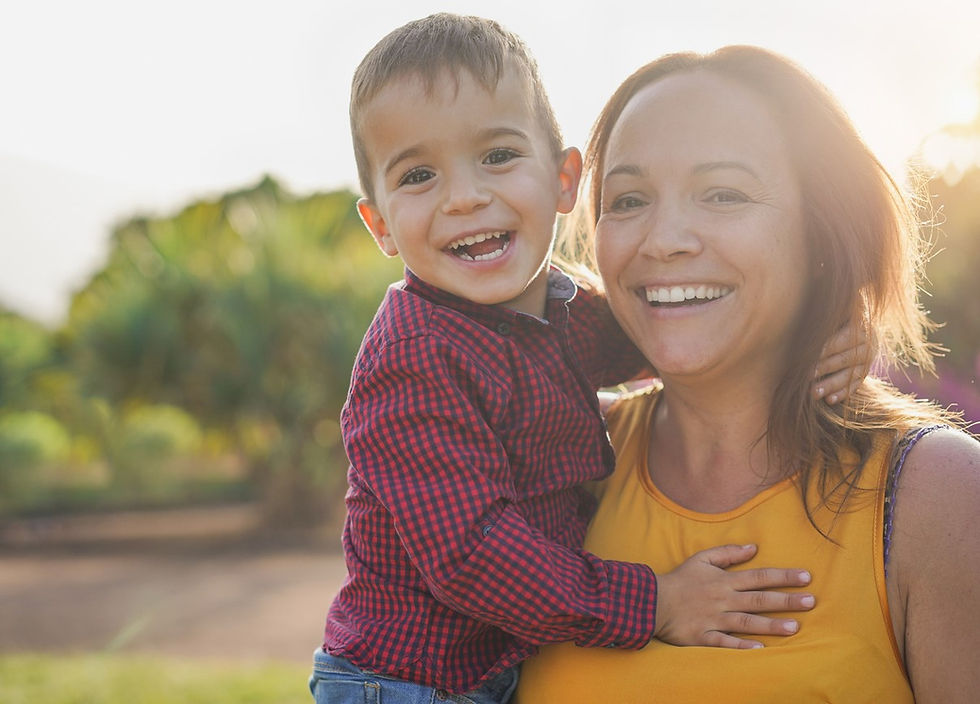Ask Yesenia: Teaching Children to Cope With Anxiety
- Yesenia Gomez-Carrillo
- Jul 29, 2025
- 3 min read
Life moves fast. Between work deadlines, school drop-offs, lunchboxes, and the constant ping of notifications, sometimes it doesn’t take much for me to feel like I’m barely holding it all together. As a kid, I remember lying awake in bed replaying the day in my mind wondering if I missed something or said something wrong. The fear of messing up had a way of swallowing everything else. Now, as an adult, I’ve learned how to manage it, but still find myself slipping into that anxious place, as so many of us do. And how can we not, with the pace life moves? When this happens to me, it’s a clear sign that my stress and anxiety have taken over. It’s time to press the reset button.
This monthly column provides tips for anyone who is helping raise children, based on the world-renowned Triple P – Positive Parenting Program, available to families in Santa Cruz County. If you have a question or idea for a future column, email me at triplep@first5scc.org.
Dear Yesenia,
My 11-year-old daughter is a kind, responsible kid who tries really hard in school and rarely has any major behavior issues. But lately, I’ve become worried about how anxious she is. She worries about everything, forgetting homework, being late, disappointing someone, or doing something wrong. She often gets so upset that she can’t think straight. I tell her everything will be fine, but that seems to make her more upset. I’m worried this will get worse as she gets older and faces more pressure. What should I do?
- Valerie
Dear Valerie,
You’re on the right track by taking your daughter’s emotions seriously. Anxiety is a natural reaction to anything the brain sees as a “threat,” including stress at home, school, with friends or in the community. Signs of anxiety can include a faster heartbeat and breathing, sweaty palms, tense muscles, light-headedness or an upset stomach. These physical reactions can make us more alert and prepared to do our best in situations like tests or sports. However, they can also be frightening for some children, especially if they experience frequent or intense anxiety. It can lead children to believe that something is wrong with them or something bad will happen. If left alone, these thoughts and feelings can become overwhelming and interfere with daily life. Here are some tips to help your family:
Acknowledge and empathize with your child’s feelings. When children become upset, their “emotional brains” take over, making it hard for them to see the situation and options clearly. Many parents try to reassure their children that everything will be fine, solve the problem or tell them the situation is not really a big problem. While the parents might be right, children are more likely to believe these words once their fears have been acknowledged as real to them. A simple statement such as, “I can see you’re really worried,” or, “I’ve felt that way before,” can have a calming effect.
Ask questions and listen. Try to find out whether something happened recently that caused her to become anxious or nervous. Then ask a few questions to encourage her to express her thoughts and feelings. Listen and continue to acknowledge her feelings, even if you don’t understand or agree with how she views the situation.
Guide your child through problem-solving steps. Help her define the problem or concern, then brainstorm possible ways to handle it. Encourage her to come up with ideas first before offering suggestions. Talk about the pros and cons of each idea, then help her decide which one to try. Have her practice what she’ll say or do to build her confidence in her ability to handle the situation. After she tries her solution, talk about how it worked and what she would do the next time something similar happens. Over time, this process will help your daughter learn ways to handle stress and anxiety before it becomes overwhelming.
Stay calm and patient. Helping children deal with anxiety can add more stress to a family. Use coping strategies yourself, like taking deep breaths, saying positive affirmations, or taking a break. It will help you stay calm and patient, while also modeling healthy coping strategies.
FINAL THOUGHTS: Stress and anxiety are unavoidable parts of everyday life, but they don’t have to take over our lives. Learning to cope with anxiety in childhood is an important life skill that can be developed with time and practice.
Yesenia Gomez-Carrillo is the mother of a 3-year-old daughter and the Triple P Program Manager for First 5 Santa Cruz County. Scientifically proven, Triple P is made available locally by First 5, the Santa Cruz County Health Services Agency, and the Santa Cruz County Human Services Department. To find a Triple P parenting class or practitioner, visit http://triplep.first5scc.org, http://www.facebook.com/triplepscc, or contact First 5 Santa Cruz County at 465-2217 or triplep@first5scc.org.




It is important to help children manage anxiety for their health and development. When school work adds additional stress, I turn to the best academic writing service for assistance to help me complete that work efficiently. This assistance helps me focus on my own development, learn coping techniques, and maintain my studies and balance.